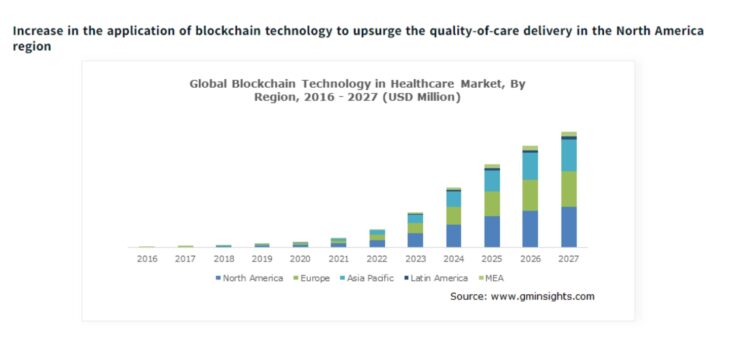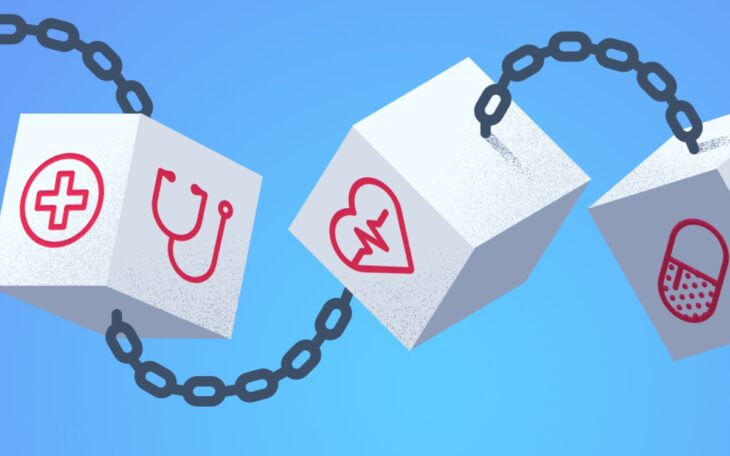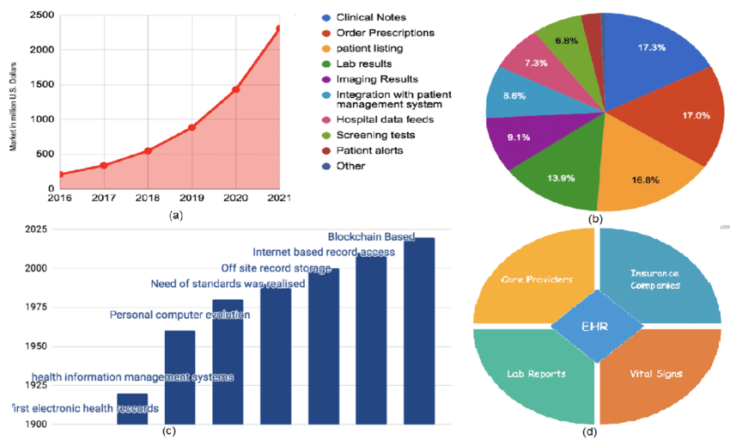Healthcare data management systems are having a hard time in data transparency, traceability, immutability, audit, data provenance, flexible access, privacy, and security. Are you thinking about the future of blockchain? Blockchain is an emerging and disruptive technology that has the power to revolutionize, reshape, and transform the way data is managed in healthcare industries. Blockchain has induced a great buzz quickly due to its potential to revolutionize industries such as sports, healthcare and cryptocurrency markets found here. One of the sectors revolutionized by blockchain is healthcare and we will understand through this article how blockchain impacted the medical industry.
Healthcare is one of the sectors that demands innovation. Many branches of healthcare are complicated and expensive, such as data maintenance and sharing, contract negotiation, and other time and money-consuming activities.
The US marked a presence of blockchain technology in healthcare in 2020 and is on the brink to reach over USD 1.91 billion by 2027. As the statistics of the below graph display, blockchain is assisting with a pace and increasing the facilities of the healthcare industry in the North American region. Blockchain is tempering the industry, so we can estimate that the future of blockchain will be game-changing.

Source: Gm insights
Contents
How Is Blockchain Impacting The Healthcare Industry?
The medical industry needs blockchain technology to manage various functions and highly secure technology. It can assist in accessing data of patients of healthcare with reduced costs. Blockchain is combined with the compounding nature of data and innovation; futureproofing technologies can be beneficial to encourage a corner of growth.
Although many revolutionary companies have enlisted blockchain in transforming industry technologies, blockchain has enabled emerging tools to fight the pandemic and helped in identity management. It involves sharing data, software code for research, supply chain management for medications, medical supplies, and vaccines.
Contribution of Blockchain in Healthcare Industry
Blockchain contributes significantly to the medical industry by securing confidential data. Patients’ data is helter-skelter among different facilities for accessing vital medical information. Blockchain could revolutionize the way data storage and transmission are done. It provides easy and rapid communication, being an ultra-secure solution in the industry.
Blockchain helps in storing the medical record confidentiality and protects it from cyberattacks. Patient data can be updated across multiple places and facilities in Real-time with security.

Source: unsplash.com
Unprecedented data efficiency
The quick advancements in IoT have created a corner to revolutionize the healthcare industry with blockchain technology by bringing significant enhancements in e-health, medical records, prescribing drug data, and information related to insurance. IoT-based medical devices help collect invaluable data of visitors and patients, automating workflows providing insights on symptoms and trends of disease.
The development of IoT has led to ceaseless innovations in the healthcare sector. All the facilities can be provided remotely and deliver patients more control over their lives and treatments. Managing EHR/EMR safely has become the tip of the iceberg because data gets spread over the medical facilities. Most medical systems are centralized and have a weak point of data leakage that can breach security and give a place to cyber-attacks.
However, blockchain technology can overcome the situation by providing decentralized data, transparency, traceability, immutability, audit, privacy, and security. Blockchain is a boon for data security. It’s fully decentralized and immutable. The data can be accessed. If any changes are done from any node, they will be visible to everyone in the blockchain. Blockchain provides secure health data provenance by preventing unauthorized access and alteration of medical systems. It empowers traceability in medical industries. Blockchain uses a time-stamping procedure that includes computing hash values of the provenance records shared to consensus nodes to ensure a consistent ledger of all valid transactions.

Source: datamatrixinc.com
Assist in data provenance and transparent networks
Data provenance is essential to build significant trust in health data by providing information about data creation, access, and transfer. Blockchain empowers health data provenance by implementing track changes to data from its origin to its current form. Storing previous data can enhance trustworthiness and accuracy for data validation and audits.
If we talk about transparent networks, we all know that many drug fraud problems occur in the healthcare industry. Once medication production is completed, it should be sent to the wholesale distributors from the producers and further to retail companies and then to customers. There is always the risk of fake medicines being replaced with the original ones during this supply chain cycle. Blockchain technology can help keep track of the manufacturing chain of the drug. Blockchain-based transactions are immutable and time-stamped, ensuring that the information cannot be tampered with or replicated. Once the drug is transferred from one place to another, its data can be stored on the blockchain, which helps to make efficient drug traceability and reduces the risk of pseudo medications.
Data handling
High handling costs related to patient data retrieval and transfer is another primary concern the existing healthcare systems raise. A patient medical record is split around multiple health facilities. Collecting complete medical forms of the patient from nonsystematic hospital record management systems can lead to excess time and costs. Blockchain technology can reduce the administrative cost posed by third parties involved in the existing healthcare system. It enables flexible data access to the patient’s medical record, which is collected and stored from multiple sources, such as patient documentation, personal wearable, and handheld devices, EMRs, to name a few.

Source: insight.com
Transparency
Transparency is one of the hypnotic features of blockchain technology. They enable transparency in the healthcare industry to help in providing privacy, security, and openness simultaneously. Blockchain offers a higher level of transparency and ensures confidentiality, and gives authorized control over data and information parallelly. All the transactions performed on the public blockchain are easy to search, detect and trace.
The transparency provided by blockchain ensures healthcare institutions gather knowledge and complete information of ingredients to make a medicine, circumstances under which it’s manufactured, and the workflow among wholesalers, distributors, resellers, and customers. More transparency will make the process more efficient. Blockchain achieves transparency via encryption and control mechanisms.
Some of the case studies where blockchain has been implemented in the healthcare industry
We discussed the impacts and benefits of blockchain in the healthcare industry. Blockchain is open and highly secure applied to the medical sector in various ways. We have some live examples worldwide where blockchain technology is implemented practically, and they have seen a drastic change in data security and management.
Already, premier healthcare industry companies are taking advantage of blockchain. If you have made up your mind and want to hire a blockchain developer, click here.

Source: cryptocoinscharts.com
Curisium
Acquired in 2020 by Healthvariety, Rebate negotiation, and contract management are two major concerns that everyone in the healthcare industry knows contract negotiation is tough to discuss and time-consuming.
Cirsium has introduced blockchain for rebate negotiation and contract management. They have created a system that aligns the process. Curisium allows providers and payers to participate in innovative, effective, and safe contracting arrangements. On the whole, Healthverity’s acquisition came up with extensive customization and seamless automation of workflows to implement expanded opportunities for collaboration and cost-saving across all parties.
Chronicled
The medical industry suffers from the lack of facilities and technology to secure patients’ sensitive data. Blockchain is the best alternative that provides finely customizable openness while holding only the best security standards for interoperability. It will give permission to health information systems to work within and across organizational boundaries to enhance the efficient delivery of healthcare for individuals and communities.
Chronicled showed its interest in the mediledger network to bring together trading partners and medical institutions closer with the help of blockchain technology that innovated the industry and prevented it from the threat of communicative and organization mishaps. Blockchain has built the trust among automation of once hectic processes to greater accountability.

Source: medicaldevice-network.com
Patientory
Blockchain networks help establish transparency and privacy that assist in concealing patient data. It provides data access and data sharing when required. Blockchain technology helps in protecting data from cyber-attacks as state-of-art security solutions defend it. Attackers would need vast computational functionalities even to attempt targeting a blockchain-powered network, severely limiting the security, possibility, and effectiveness of attacks.
Patientory leverages this advantage in developing patient-centric applications and services, giving the company more control over its well-being. Up-to-date patient history and data, pandemic tracking and reporting, secure communication with authorized personnel, and many more in the bucket of innovative solutions.
Future of blockchain in the healthcare industry
Blockchain technology is serving various industries with innovations. Blockchain can help the medical industry with new models for consents, minor payments and demonetization, track clinical outcomes and supply chain, new methods for accreditation, lower energy requirements, etc. The future of blockchain is expected to have some good fortune and new inventions for the healthcare industry.

Source: researchgate.net
Conclusion
A blockchain network can contribute innovative solutions in various sectors, including healthcare. It can be used in the healthcare system to preserve and exchange patient data via different nodes such as hospitals, diagnostic laboratories, pharmacy firms, and physicians.
Blockchain technology can accurately identify severe mistakes and even dangerous ones in the medical field. This technology can improve the performance, security, and transparency of sharing medical data in the healthcare system. Medical institutions can benefit from this technology to gain insight and better use medical records.
It provides versatility, interconnection, accountability, and authentication for data access while avoiding data manipulation concerns in healthcare. Furthermore, it supports a unique data storage pattern at the highest level of security. Hence, we can say that the future of blockchain in the healthcare industry is very bright and many new advancements in the health industry are coming soon.
